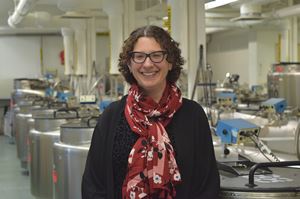
The Scheinfeldt Lab researches the ways in which human evolutionary history has shaped patterns of genetic and genomic variation across contemporary human populations. We have a particular interest in variation that impacts health and disease.
Research Interests
Characterizing neutral and non-neutral patterns of variation across the human genome
- One component of our research involves the utilization of computational models to better predict patterns of neutral contemporary human variation. These theoretical neutral expectations can then be compared against empirical data to identify regions of the genome that deviate from these patterns and therefore may have been subjected to past and ongoing positive and negative selective pressures. This work contributes to a more complete picture of the genes and related phenotypes that have been affected by environmental changes due to migrations of modern humans within and outside of Africa and into novel environments such as high-altitude regions as well as Neolithic changes due to shifts in subsistence and population densities such as the genes involved in immune response to disease.
Addressing ascertainment bias in human genomics
- We investigate the ways in which study inclusion restricts the relevance of results across human populations. This work examines how persistent ascertainment biases in the current research literature impact genomic data collection, variant imputation, replication across studies, generalizability to marginalized communities and clinical translation of genomic and pharmacogenomic research results.
Leveraging biobanking resources for human genomics
- We develop user friendly, web-based tools designed to facilitate the exploration of Repository biospecimens that have been characterized with large-scale sequencing technologies.
- SNP Search
- SNP Search is a dynamic variant-level query of whole genome sequencing data collected from the 1000 Genomes Project sample collection. Variant calls were generated using human reference genome build GRCh38. The SNP level, multi-SNP level, and Gene level searches query data collected from 3,202 individuals living around the world. Additional details pertaining to sequence data collection and analysis can be found in Byrska-Bishop et al., 2022, and a description of the tool can be found in Gharani et al., 2023; please cite both publications when using this resource in research studies.
- Star Allele Search
- Star Allele Search is a dynamic query of *alleles (i.e., pharmacogenetic annotations) based on whole genome sequencing data collected from the 1000 Genomes Project sample collection, including 3,202 individuals living around the world. Additional details pertaining to the *allele annotation can be found in Calendo et al., 2023, and additional details pertaining to the samples and sequence data collection and analysis can be found in Gharani et al., 2023; please cite both publications when using this resource in research studies.
- Gene Expression Search
- Gene Expression Search is a dynamic query of gene expression data collected from a subset of the 1000 Genomes Project samples. Additional details pertaining to data collection and analysis can be found in Lappalainen et al., 2013, and a description of the tool can be found in Gharani et al., 2023; please cite both publications when using this resource in research studies.
- GeT-RM PGx Search
- iPSC LRS Search
- iPSC long read sequencing (LRS) Search is a dynamic genomic visualization browser of whole genome, long-read sequencing data collected from National Institute of General Medical Sciences Human Genetic Cell Repository (NIGMS Repository) iPSCs and matched parental cell lines. Linear Genome View searches can be queried by HUGO gene name (e.g., CYP2D6), by rsid (e.g., rs35742686), or by chromosome and position (e.g., chr22:42,126,498..42,130,880). Additional details pertaining to data collection, analysis and visualization can be found in Scheinfeldt et al., 2025.
 About Dr. Laura Scheinfeldt
About Dr. Laura Scheinfeldt
- Associate Professor
- Director, Repository Science
- Principal Investigator, NINDS Human Genetics Resource Center
- Principal Investigator, NHGRI Sample Repository for Human Genetic Research
- lscheinfeldt@coriell.org
My research focuses on the ways in which human evolutionary history has shaped patterns of genetic, genomic and phenotypic variation across contemporary humans. One area of particular focus is how persistent ascertainment biases in the current research literature impact inclusion in genomic studies, genomic data collection, variant imputation, replication across studies, generalizability to marginalized communities and clinical translation of genomic and pharmacogenomic research results.
Scheinfeldt Lab Members
Tatyana Pozner, PhD is a repository staff scientist using stem cell derived cellular models to study drug response and disease.
Collaborators
Dara Kusic, PhD studies how genetic and non-genetic information can be used in the prevention or treatment of disease.
Neda Gharani, PhD studies genetics of complex disease and drug response.
Announcements
Recent publications include:
Scheinfeldt et al., 2025 describes a new iPSC resource of five iPSCs and matched parental cell lines with accompanying publicly available HiFi whole genome sequencing data.
Scheinfeldt et al., 2025 describe a new Genetic Testing Reference Material (GeT-RM) Program resource for the identification of characterized DNA Reference Materials for PGx and HLA testing.
Pozner et al., 2025 reviews the impact of source materials (fibroblasts, LCLs, PBMCs) and non-integrating reprogramming approaches (Sendai, episomal) on reprogramming success rates.
Calendo et al., 2024 describes a new user-friendly PGx annotation R package, ursaPGx (https://github.com/coriell-research/ursaPGx), for pharmacogenetic star allele annotation using phased whole genome sequencing data.
Gharani et al., 2024 describes the application of ursaPGx in a new PGx annotation database and search tool (https://www.coriell.org/StarAllele/Search) of 1000 Genomes Project samples.


 About Dr. Laura Scheinfeldt
About Dr. Laura Scheinfeldt